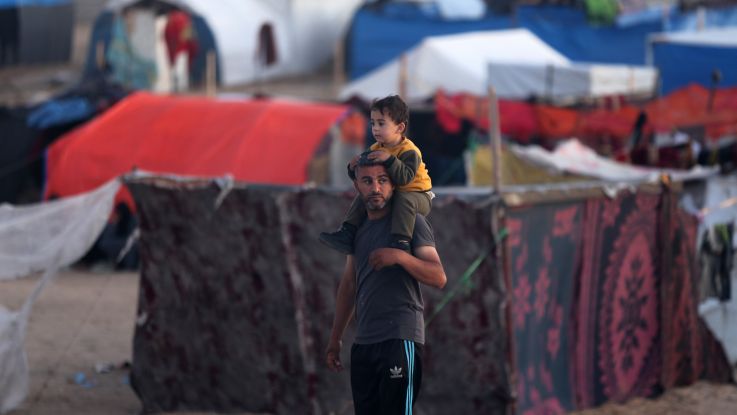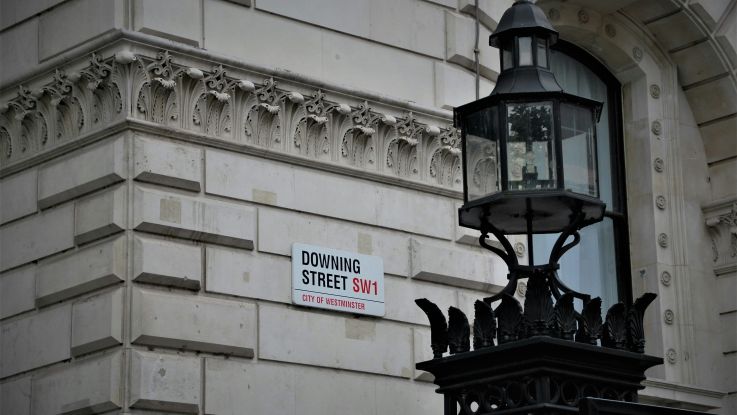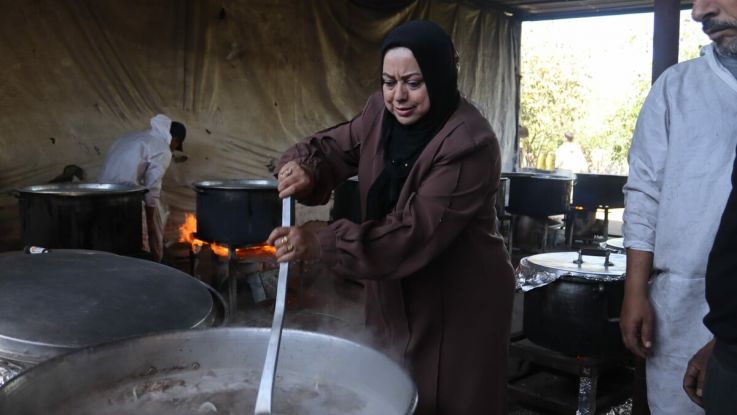Coronavirus: how does women’s leadership make a difference in a crisis?
6 May 2020
In the world’s poorest countries, the leadership of women at a grassroots local level will save lives during the coronavirus crisis. Find out why.
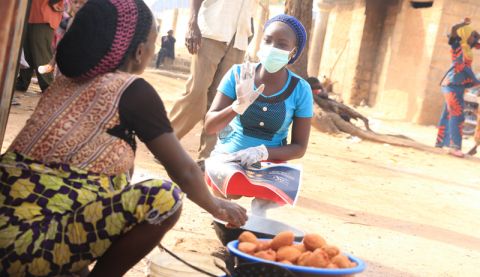
In Nigeria, members of the Community Action Response Team are conducting house-to-house visits to increase awareness about Covid-19 and hygiene practice. Photo: ActionAid
Across the world, the coronavirus pandemic is shining a light on different strategies of leadership.
In recent weeks, leaders like New Zealand Prime Minister Jacinda Arden and Taiwan President Tsai Ing-Wen have been celebrated for their responses.
But it is not only those at the top who are making a huge difference.
In the world’s poorest countries, where the coronavirus pandemic will have the most severe and sustained impact on women and girls, it is the leadership of women at a grassroots local level which will save lives.
What does this mean for women’s rights?
Evidence and experience show that humanitarian emergencies magnify existing inequalities, with long-lasting and detrimental impact on women and their rights.
Learning from other epidemics, including the Ebola outbreak, highlights that in crises, existing gender discrimination is exacerbated.
This can mean that women are more likely to experience an increase in different types of gender-based violence (GBV), including domestic violence.
They may also take on more unpaid care responsibilities, lose income and access to decent work, and have reduced access to critical services – including sexual and reproductive health services.
Crucially, women are also consistently excluded from decision-making spaces and processes that determine their futures. When this happens, women’s rights and needs are often overlooked, and their contributions are not valued, with devastating impact.
Recognising the extent to which disease outbreaks affect groups of diverse women and men differently in both the immediate and longer term, and why, is fundamental to a socially just and sustainable response.
Crucially, women are also consistently excluded from decision-making spaces and processes that determine their futures. When this happens, women’s rights and needs are often overlooked, and their contributions are not valued, with devastating impact.
An understanding of the primary and secondary effects of a health emergency on different individuals, groups, and communities, is the first step towards the design and implementation of effective, equitable policies and interventions.
Why we need to invest in women’s leadership as part of coronavirus and beyond
At ActionAid we have been advocating for the importance of investing in local and women-led response efforts for many years.
Our Humanitarian Signature centres on accountability to affected communities and shifting power. It recognises the leadership of local women and their collective action as part of humanitarian action. And crucially, in focusing on resilience and sustainability, as well as meeting immediate needs, our approach paves the way for the transition from response to recovery, building the foundations for long-term and transformational change.
Pragmatism and women’s leadership
Prioritising women’s leadership is not only the right thing to do, it can help strengthen the effectiveness and lasting impact of humanitarian responses.
Evidence and experience (for example, from the Indonesian earthquakes and tsunami in 2018) highlight that local women, women-led organisations and women’s rights organisations, bring valuable skills and assets to localised humanitarian action.
They are often able to gain access to hard-to-reach communities and those most marginalised within them, they bring a strong understanding of the local context and the needs and realities of women, girls and the community as a whole – including prevention and protection from violence, and they offer crucial insight into how to engage with key stakeholders.
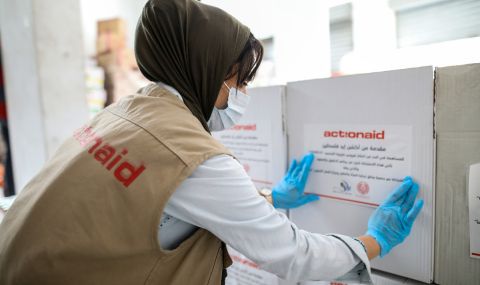
Volunteers in the occupied Palestinian territory are distributing food and hygiene items .
If local women and women-led organisations are not supported to lead, there is a risk that the needs of communities will not be met, and that their exclusion will reinforce structural inequalities and keep communities marginalised and vulnerable.
Why women-led public health campaigns succeed
We see this happening time and time again. ActionAid’s experience responding to the Ebola crisis in Liberia, Sierra Leone and the Democratic Republic of Congo (DRC) found that public health campaigns led by local women and in local languages were the most effective strategy in preventing disease outbreak.
Women played a critical role in contact tracing and case management and the distribution of essential supplies for people in quarantine.
As part of these efforts ActionAid worked with women-led groups across the country to mobilise door to door information sharing, providing information on disinfecting homes and safe management of contact with sick people. Women played a critical role in contact tracing and case management and the distribution of essential supplies for people in quarantine.
For many countries, health infrastructure is weak, and immediate investment in prevention and control strategies in communities is critical to avoid widespread disease outbreak.
Elevating women’s voices in response efforts
It is essential that we promote women’s leadership and feminist approaches as part of coronavirus response efforts, and as part of our longer-term approach to transforming the humanitarian system.
Our approach must also elevate other feminist voices and partners from the Global South, as highlighted by the Gender and Development Network1 and as illustrated recently by the Feminist Alliance for Rights.2
ActionAid is also a proud member and co-founder of the Feminist Humanitarian Network3 – an international network of women leaders, local and national women’s rights organisations and national and regional women’s networks, committed to a transformed humanitarian system that promotes a feminist humanitarian agenda.
Along with our local ActionAid partners, Feminist Humanitarian Network members are already responding to coronavirus on the ground.
For example, in Vanuatu, ActionAid has supported the locally-led initiative Women Wetem Weta (Women Weathers Watch) to develop and distribute SMS in the local language Bislama in order to prevent Covid-19 and promote social distancing among the population.
In Palestine, member of the Feminist Humanitarian Network SAWA are operating a free helpline to support Palestinian women, children, and refugees and raise awareness on Covid-19. They are currently operating from their homes due to travel restrictions and home isolation, and operate for 24 hours, 7 days a week.
In Liberia the Community Health Care Initiative – an ActionAid partner and Feminist Humanitarian Network member - have shared self-care information and produced flyers to raise awareness on the symptoms of Covid-19, best practice, and prevention.
They have also translated information into local languages based on women’s knowledge of different communities, secured a slot in the daily radio to speak about the issues women and girls face during Covid-19, and created ‘jingles/songs’ that can be shared in school to raise awareness.
The power of women-led response: our latest brief
Shifting power to women makes a difference, from the very top to the bottom. This is why ActionAid’s Humanitarian Signature allows us to create lasting change.
Our latest brief Creating Lasting Impact: The Power of Women-led Localised Response to Covid-19 makes a series of practical recommendations for Covid-19 response efforts to be driven by local women, as decision makers and partners, will:
- Support rapid and contextually relevant efforts to curb the spread and impact of Covid-19, reaching families and communities at scale.
- Ensure the gendered impact of Covid-19 is addressed and the rights of women and girls are protected and prioritised.
- Pave the way for sustainable recovery efforts, grounded in fairer and more gender-just communities and societies.

